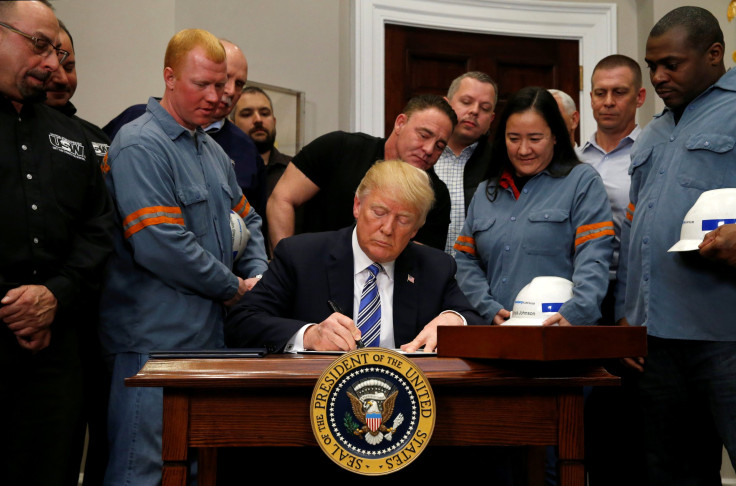US-China Trade War: Trump's Economic Adviser Admits US Consumers Will Suffer For Tariffs

U.S. businesses and consumers appear to be the real victims of President Trump’s 10% to 25% tariff increase on Chinese goods announced late last week, Larry Kudlow, Director of the National Economic Council reluctantly admitted on Fox News on Sunday.
Kudlow repeatedly attempted to frame the tariffs as bad news for both sides, which may be true for different reasons and at different degrees, but ultimately he admitted the actual costs of increased tariffs are a form of tax on the American people, since U.S. manufacturers using Chinese products may pass on any additional cost for goods to American consumers.
Fox News’ Chris Wallace essentially asked Kudlow the same question three times before Kudlow admitted the majority of the brunt of the tariff war will fall on the American consumer.
Wallace pointed out President Trump has said the Chinese will pay the tariffs. “They may suffer consequences but U.S. businesses and consumers will actually pay, correct?”
“Fair enough,” Kudlow replied. “In fact, both sides will pay…in these things.”
Wallace pointed out China doesn’t pay tariffs on goods coming into the U.S. and Kudlow responded, “No, but the Chinese will suffer GDP losses and so forth with respect to a diminishing export market.”
So, Wallace concluded, U.S. businesses and consumers absorb the cost of tariffs as a form of tax on imported goods, and Kudlow replied, “To some extent. I can’t disagree with that.”
Chris Wallace: "It's not China that pays the tariffs, it's American consumers."
— Brian Tyler Cohen (@briantylercohen) May 12, 2019
Larry Kudlow: "Well it's both sides."
CW: "But it's not both sides. It's American companies and American consumers."
LK: "You're right. Again, both sides."
Beyond parody.pic.twitter.com/iZrOQ3UAQY
President Trump has repeatedly said the burden of increased tariffs will fall on China, not the U.S.
Kudlow has emphasized that Trump and Chinese President Xi Jinping expect to meet at the next G-20 in Japan in late June.
At present, the U.S. imports about $535 billion in Chinese goods annually while Chinese imports from the U.S. are about $120 billion. While charging a tariff at the port of entry on imported goods appears to be charged to the exporter, those costs usually are passed on dollar-for-dollar to the consumer.
China’s U.S. imports are mostly agricultural so any move by China to limit U.S. imports will have serious implications for American farmers, who mostly reside in states where Trump won a majority of votes in the 2016 presidential election.
The Iowa Des Moines Register reported today the tariffs already are having a devastating impact on the local economy.
“Farmers, particularly soybean farmers, have been the tip of the spear when it comes to Chinese retaliation, and I’m not sure they can take much more,” Kirk Leeds, CEO of the Iowa Soybean Association, said.
He added that "escalating tariffs undercut any remnants of optimism” in the economic outlook, and “that’s what’s most devastating about this.”
Trump has already authorized increased tariffs on $200 billion worth of Chinese goods leaving port on or after last Friday and is considering tariffs on another $325 billion of Chinese products, according to reports.
Meanwhile, the Dow Jones Industrial Average (DJI) on Monday plummeted 580 points, or 2.24%, as of 3:05 pm. ET, after China retaliated by raising tariffs on $60 billion.
“I think this is a prelude of things to come,” Phil Blancato, CEO of Ladenburg Thalmann Asset Management, told CNBC. “We should expect more volatility for the foreseeable future.”
Michael O’Rourke, chief market strategist at JonesTrading, told Reuters that "the market is starting to realize the situation is as bad as it could be.”
© Copyright IBTimes 2025. All rights reserved.





















